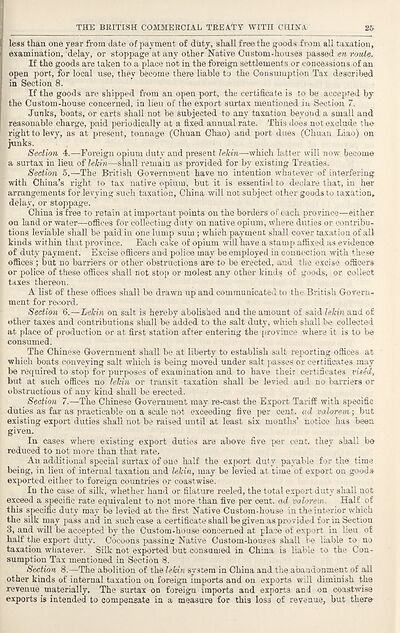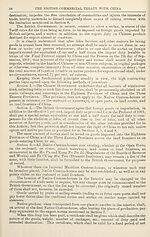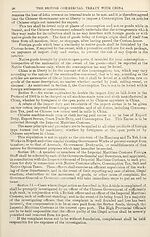1926
(77) Page 25
Download files
Complete book:
Individual page:
Thumbnail gallery: Grid view | List view

THE BRITISH COMMERCIAL TREATY WITH CHINA
25
less than one year from date of payment of duty, shall free the goods from all taxation,
examination, delay, or stoppage at any other Native Custom-houses passed en route.
If the goods are taken to a place not in the foreign settlements or concessions of an
open port, for local use, they become there liable to the Consumption Tax described
in Section 8.
If the goods are shipped from an open port, the certificate is to be accepted by
the Custom-house concerned, in lieu of the export surtax mentioned in Section 7.
Junks, boats, or carts shall not be subjected to any taxation beyond a small and
reasonable charge, paid periodically at a fixed annual rate. This does not exclude the
right to levy, as at present, tonnage (Chuan Chao) and port dues (Chuan Liao) on
junks.
Section 4.—Foreign opium duty and present lekin—which latter will now become
a surtax in lieu of lekin—shall remain as provided for by existing Treaties.
Section 5.—The British Government have no intention whatever of interfering
with China’s right to tax native opium, but it is essential to declare that, in her
arrangements for levying such taxation, China will not subject other goods to taxation,
delay, or stoppage.
China is free to retain at important points on the borders of each province—either
on land or water—offices for collecting duty on native opium, where duties or contribu¬
tions leviable shall be paid in one lump sum ; which payment shall cover taxation of all
kinds within that province. Each cake of opium will have a stamp affixed as evidence
of duty payment. Excise officers and police may be employed in connection with these
offices ; but no barriers or other obstructions are to be erected, and the excise officers
or police of these offices shall not stop or molest any other kinds of goods, or collect
taxes thereon.
A list of these offices shall be drawn up and communicated to the British Govern¬
ment for record.
Section 6.—Lekin on salt is hereby abolished and the amount of said lekin and of
other taxes and contributions shall be added to the salt duty, which shall be collected
at place of production or at first station after entering the province where it is to be
consumed.
The Chinese Government shall be at liberty to establish salt reporting offices at
which boats conveying salt which is being moved under salt passes or certificates may
be required to stop for purposes of examination and to have their certificates vised,
but at such offices no lekin or transit taxation shall be levied and no barriers or
obstructions of any kind shall be erected.
Section 7.—The Chinese Government may re-cast the Export Tariff with specific
duties as far as practicable on a scale not exceeding five per cent, ad valorem; but
existing export duties shall not be raised until at least six months’ notice has been
given.
In cases where existing export duties are above five per cent, they shall be
reduced to not more than that rate.
An additional special surtax of one half the export duty payable for the time
being, in lieu of internal taxation and lekin, may be levied at time of export on goods
exported either to foreign countries or coastwise.
In the case of silk, whether hand or filature reeled, the total export duty shall not
exceed a specific rate equivalent to not more than five per cent, ad valorem. Half of
this specific duty may be levied at the first Native Custom-house in the interior which
the silk may pass and in such case a certificate shall be given as provided for in Section
3, and will be accepted by the Custom-house concerned at place of export in lieu of
half the export duty. Cocoons passing: Native Custom-houses shall be liable to no
taxation whatever. Silk not exported but consumed in China is liable to the Con¬
sumption Tax mentioned in Section 8.
Section 8.—The abolition of the lekin system in China and the abandonment of all
other kinds of internal taxation on foreign imports and on exports will diminish the
revenue materially. The surtax on foreign imports and exports and on coastwise
exports is intended to compensate in a measure for this loss of revenue, but there-
25
less than one year from date of payment of duty, shall free the goods from all taxation,
examination, delay, or stoppage at any other Native Custom-houses passed en route.
If the goods are taken to a place not in the foreign settlements or concessions of an
open port, for local use, they become there liable to the Consumption Tax described
in Section 8.
If the goods are shipped from an open port, the certificate is to be accepted by
the Custom-house concerned, in lieu of the export surtax mentioned in Section 7.
Junks, boats, or carts shall not be subjected to any taxation beyond a small and
reasonable charge, paid periodically at a fixed annual rate. This does not exclude the
right to levy, as at present, tonnage (Chuan Chao) and port dues (Chuan Liao) on
junks.
Section 4.—Foreign opium duty and present lekin—which latter will now become
a surtax in lieu of lekin—shall remain as provided for by existing Treaties.
Section 5.—The British Government have no intention whatever of interfering
with China’s right to tax native opium, but it is essential to declare that, in her
arrangements for levying such taxation, China will not subject other goods to taxation,
delay, or stoppage.
China is free to retain at important points on the borders of each province—either
on land or water—offices for collecting duty on native opium, where duties or contribu¬
tions leviable shall be paid in one lump sum ; which payment shall cover taxation of all
kinds within that province. Each cake of opium will have a stamp affixed as evidence
of duty payment. Excise officers and police may be employed in connection with these
offices ; but no barriers or other obstructions are to be erected, and the excise officers
or police of these offices shall not stop or molest any other kinds of goods, or collect
taxes thereon.
A list of these offices shall be drawn up and communicated to the British Govern¬
ment for record.
Section 6.—Lekin on salt is hereby abolished and the amount of said lekin and of
other taxes and contributions shall be added to the salt duty, which shall be collected
at place of production or at first station after entering the province where it is to be
consumed.
The Chinese Government shall be at liberty to establish salt reporting offices at
which boats conveying salt which is being moved under salt passes or certificates may
be required to stop for purposes of examination and to have their certificates vised,
but at such offices no lekin or transit taxation shall be levied and no barriers or
obstructions of any kind shall be erected.
Section 7.—The Chinese Government may re-cast the Export Tariff with specific
duties as far as practicable on a scale not exceeding five per cent, ad valorem; but
existing export duties shall not be raised until at least six months’ notice has been
given.
In cases where existing export duties are above five per cent, they shall be
reduced to not more than that rate.
An additional special surtax of one half the export duty payable for the time
being, in lieu of internal taxation and lekin, may be levied at time of export on goods
exported either to foreign countries or coastwise.
In the case of silk, whether hand or filature reeled, the total export duty shall not
exceed a specific rate equivalent to not more than five per cent, ad valorem. Half of
this specific duty may be levied at the first Native Custom-house in the interior which
the silk may pass and in such case a certificate shall be given as provided for in Section
3, and will be accepted by the Custom-house concerned at place of export in lieu of
half the export duty. Cocoons passing: Native Custom-houses shall be liable to no
taxation whatever. Silk not exported but consumed in China is liable to the Con¬
sumption Tax mentioned in Section 8.
Section 8.—The abolition of the lekin system in China and the abandonment of all
other kinds of internal taxation on foreign imports and on exports will diminish the
revenue materially. The surtax on foreign imports and exports and on coastwise
exports is intended to compensate in a measure for this loss of revenue, but there-
Set display mode to:
![]() Universal Viewer |
Universal Viewer | ![]() Mirador |
Large image | Transcription
Mirador |
Large image | Transcription
Images and transcriptions on this page, including medium image downloads, may be used under the Creative Commons Attribution 4.0 International Licence unless otherwise stated. ![]()
| Asian directories and chronicles > 1926 > (77) Page 25 |
|---|
| Permanent URL | https://digital.nls.uk/196489174 |
|---|
| Attribution and copyright: |
|
|---|---|
| Description | Volumes from the Asian 'Directory and Chronicle' series covering 1917-1941, but missing 1919 and 1923. Compiled annually from a multiplicity of local sources and research. They provide listings of each country's active corporations, foreign residents and government agencies of all nationalities for that year, together with their addresses. Content includes: various treaties; coverage of conflicts; currencies and taxes; consular fees; weights and measures; public holidays; festivals and traditions. A source of information for both Western states and communities of foreigners living in Asia. Published by Hongkong Daily Press. |
|---|---|
| Shelfmark | H3.86.1303 |
| Additional NLS resources: |

